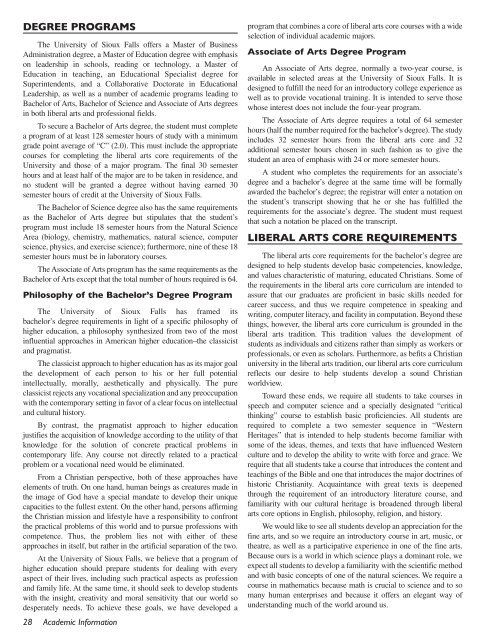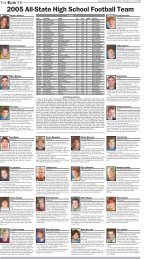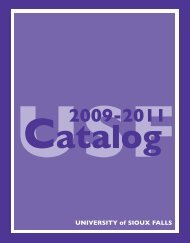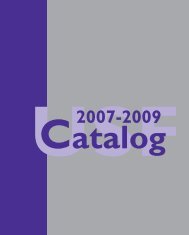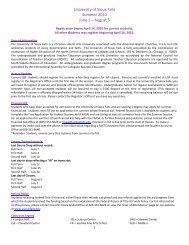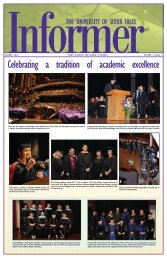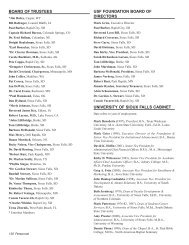USF TELEPHONE DIRECTORY - University of Sioux Falls
USF TELEPHONE DIRECTORY - University of Sioux Falls
USF TELEPHONE DIRECTORY - University of Sioux Falls
Create successful ePaper yourself
Turn your PDF publications into a flip-book with our unique Google optimized e-Paper software.
DEGREE PROGRAMS<br />
The <strong>University</strong> <strong>of</strong> <strong>Sioux</strong> <strong>Falls</strong> <strong>of</strong>fers a Master <strong>of</strong> Business<br />
Administration degree, a Master <strong>of</strong> Education degree with emphasis<br />
on leadership in schools, reading or technology, a Master <strong>of</strong><br />
Education in teaching, an Educational Specialist degree for<br />
Superintendents, and a Collaborative Doctorate in Educational<br />
Leadership, as well as a number <strong>of</strong> academic programs leading to<br />
Bachelor <strong>of</strong> Arts, Bachelor <strong>of</strong> Science and Associate <strong>of</strong> Arts degrees<br />
in both liberal arts and pr<strong>of</strong>essional fields.<br />
To secure a Bachelor <strong>of</strong> Arts degree, the student must complete<br />
a program <strong>of</strong> at least 128 semester hours <strong>of</strong> study with a minimum<br />
grade point average <strong>of</strong> “C” (2.0). This must include the appropriate<br />
courses for completing the liberal arts core requirements <strong>of</strong> the<br />
<strong>University</strong> and those <strong>of</strong> a major program. The final 30 semester<br />
hours and at least half <strong>of</strong> the major are to be taken in residence, and<br />
no student will be granted a degree without having earned 30<br />
semester hours <strong>of</strong> credit at the <strong>University</strong> <strong>of</strong> <strong>Sioux</strong> <strong>Falls</strong>.<br />
The Bachelor <strong>of</strong> Science degree also has the same requirements<br />
as the Bachelor <strong>of</strong> Arts degree but stipulates that the student’s<br />
program must include 18 semester hours from the Natural Science<br />
Area (biology, chemistry, mathematics, natural science, computer<br />
science, physics, and exercise science); furthermore, nine <strong>of</strong> these 18<br />
semester hours must be in laboratory courses.<br />
The Associate <strong>of</strong> Arts program has the same requirements as the<br />
Bachelor <strong>of</strong> Arts except that the total number <strong>of</strong> hours required is 64.<br />
Philosophy <strong>of</strong> the Bachelor’s Degree Program<br />
The <strong>University</strong> <strong>of</strong> <strong>Sioux</strong> <strong>Falls</strong> has framed its<br />
bachelor’s degree requirements in light <strong>of</strong> a specific philosophy <strong>of</strong><br />
higher education, a philosophy synthesized from two <strong>of</strong> the most<br />
influential approaches in American higher education–the classicist<br />
and pragmatist.<br />
The classicist approach to higher education has as its major goal<br />
the development <strong>of</strong> each person to his or her full potential<br />
intellectually, morally, aesthetically and physically. The pure<br />
classicist rejects any vocational specialization and any preoccupation<br />
with the contemporary setting in favor <strong>of</strong> a clear focus on intellectual<br />
and cultural history.<br />
By contrast, the pragmatist approach to higher education<br />
justifies the acquisition <strong>of</strong> knowledge according to the utility <strong>of</strong> that<br />
knowledge for the solution <strong>of</strong> concrete practical problems in<br />
contemporary life. Any course not directly related to a practical<br />
problem or a vocational need would be eliminated.<br />
From a Christian perspective, both <strong>of</strong> these approaches have<br />
elements <strong>of</strong> truth. On one hand, human beings as creatures made in<br />
the image <strong>of</strong> God have a special mandate to develop their unique<br />
capacities to the fullest extent. On the other hand, persons affirming<br />
the Christian mission and lifestyle have a responsibility to confront<br />
the practical problems <strong>of</strong> this world and to pursue pr<strong>of</strong>essions with<br />
competence. Thus, the problem lies not with either <strong>of</strong> these<br />
approaches in itself, but rather in the artificial separation <strong>of</strong> the two.<br />
At the <strong>University</strong> <strong>of</strong> <strong>Sioux</strong> <strong>Falls</strong>, we believe that a program <strong>of</strong><br />
higher education should prepare students for dealing with every<br />
aspect <strong>of</strong> their lives, including such practical aspects as pr<strong>of</strong>ession<br />
and family life. At the same time, it should seek to develop students<br />
with the insight, creativity and moral sensitivity that our world so<br />
desperately needs. To achieve these goals, we have developed a<br />
28 Academic Information<br />
program that combines a core <strong>of</strong> liberal arts core courses with a wide<br />
selection <strong>of</strong> individual academic majors.<br />
Associate <strong>of</strong> Arts Degree Program<br />
An Associate <strong>of</strong> Arts degree, normally a two-year course, is<br />
available in selected areas at the <strong>University</strong> <strong>of</strong> <strong>Sioux</strong> <strong>Falls</strong>. It is<br />
designed to fulfill the need for an introductory college experience as<br />
well as to provide vocational training. It is intended to serve those<br />
whose interest does not include the four-year program.<br />
The Associate <strong>of</strong> Arts degree requires a total <strong>of</strong> 64 semester<br />
hours (half the number required for the bachelor’s degree). The study<br />
includes 32 semester hours from the liberal arts core and 32<br />
additional semester hours chosen in such fashion as to give the<br />
student an area <strong>of</strong> emphasis with 24 or more semester hours.<br />
A student who completes the requirements for an associate’s<br />
degree and a bachelor’s degree at the same time will be formally<br />
awarded the bachelor’s degree; the registrar will enter a notation on<br />
the student’s transcript showing that he or she has fulfilled the<br />
requirements for the associate’s degree. The student must request<br />
that such a notation be placed on the transcript.<br />
LIBERAL ARTS CORE REQUIREMENTS<br />
The liberal arts core requirements for the bachelor’s degree are<br />
designed to help students develop basic competencies, knowledge,<br />
and values characteristic <strong>of</strong> maturing, educated Christians. Some <strong>of</strong><br />
the requirements in the liberal arts core curriculum are intended to<br />
assure that our graduates are pr<strong>of</strong>icient in basic skills needed for<br />
career success, and thus we require competence in speaking and<br />
writing, computer literacy, and facility in computation. Beyond these<br />
things, however, the liberal arts core curriculum is grounded in the<br />
liberal arts tradition. This tradition values the development <strong>of</strong><br />
students as individuals and citizens rather than simply as workers or<br />
pr<strong>of</strong>essionals, or even as scholars. Furthermore, as befits a Christian<br />
university in the liberal arts tradition, our liberal arts core curriculum<br />
reflects our desire to help students develop a sound Christian<br />
worldview.<br />
Toward these ends, we require all students to take courses in<br />
speech and computer science and a specially designated “critical<br />
thinking” course to establish basic pr<strong>of</strong>iciencies. All students are<br />
required to complete a two semester sequence in “Western<br />
Heritages” that is intended to help students become familiar with<br />
some <strong>of</strong> the ideas, themes, and texts that have influenced Western<br />
culture and to develop the ability to write with force and grace. We<br />
require that all students take a course that introduces the content and<br />
teachings <strong>of</strong> the Bible and one that introduces the major doctrines <strong>of</strong><br />
historic Christianity. Acquaintance with great texts is deepened<br />
through the requirement <strong>of</strong> an introductory literature course, and<br />
familiarity with our cultural heritage is broadened through liberal<br />
arts core options in English, philosophy, religion, and history.<br />
We would like to see all students develop an appreciation for the<br />
fine arts, and so we require an introductory course in art, music, or<br />
theatre, as well as a participative experience in one <strong>of</strong> the fine arts.<br />
Because ours is a world in which science plays a dominant role, we<br />
expect all students to develop a familiarity with the scientific method<br />
and with basic concepts <strong>of</strong> one <strong>of</strong> the natural sciences. We require a<br />
course in mathematics because math is crucial to science and to so<br />
many human enterprises and because it <strong>of</strong>fers an elegant way <strong>of</strong><br />
understanding much <strong>of</strong> the world around us.


